355 Search Results for assessment
June 25, 2014
by Carole Zangari -
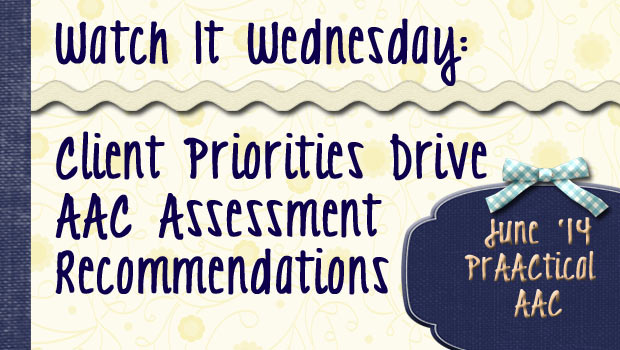
We love seeing ways in which clients are ‘heard’ in the course of AAC evaluations. Today, we return to the ACE Centre North, to see a specific example. In Shelley’s case, the need to use for the AAC device to be compatible with other technology was a driving force in the recommendations. Take a look! Direct Link to Video: https://www.youtube.com/watch?v=9UzV-x7vF84&list=UUMCsugUQwzWK3mOzuVSSmaw
March 20, 2014
by Carole Zangari -
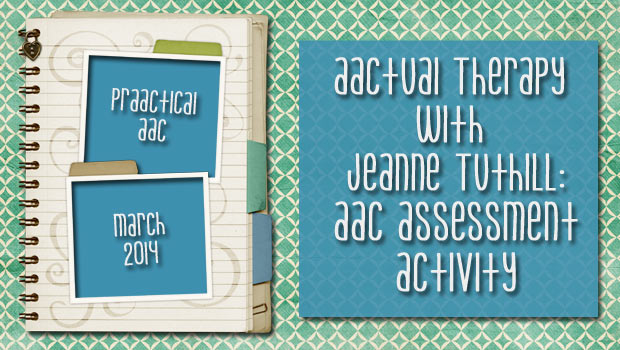
We’re so excited to introduce a new AACtual therapist, Jeanne Tuthill. Jeanne has been an SLP for over 15 years and has specialized in AAC for the past 6 years. As an AT specialist for the Collaborative Center for Assistive Technology and Training (CCATT) in Northampton, Massachusetts, Jeanne evaluates and provides consultation services for K-12 students in schools throughout Western Massachusetts. In addition, she provides workshops and professional development training in that region. Since 2012, Jeanne has served as an adjunct faculty member for the Assistive Technology Graduate Program at Simmons College. She has also presented at a number of regional and national conferences. You can see Jeanne here with her long-time student Lauren Suprenant, who is using a Step-by-Step Communicator, to share information about how she communicates with others (introduction strategy). Jeanne shares a little bit about her work and then discusses an activity that is used in their AAC... [Read More...]
August 18, 2013
by Carole Zangari -
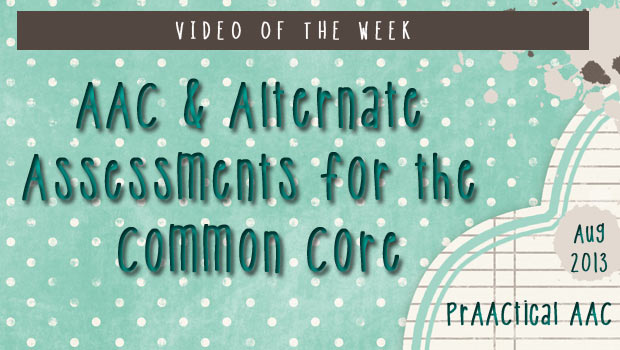
Ever thought about how the assessments for the Common Core State Standards are going to work for students with AAC needs? Take a look at what’s going on with the alternative assessment in states that are part of the Dynamic Learning Maps Consortium.
July 21, 2013
by Carole Zangari -
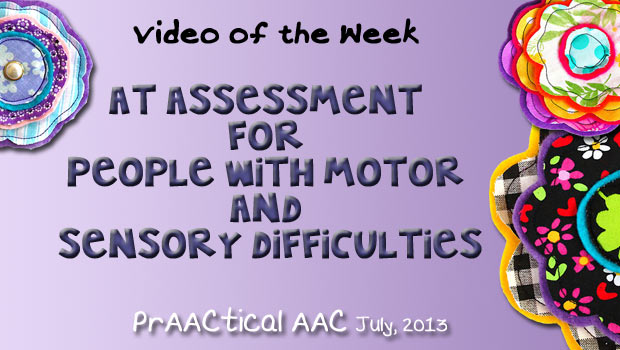
SLP Jane Korsten is well known to many as the author of the popular program, Every Move Counts, and for her leadership role in the Quality Indicators in AT group. This week, we feature Jane’s webinar on assessment in AT hosted bythe Maryland AT Network, the Maryland State Department of Education, and Johns Hopkins University. She discusses several helpful resources and reviews 6 assessment processes used in the AT assessment of individuals with motor and sensory impairments.
June 1, 2013
by Carole Zangari -
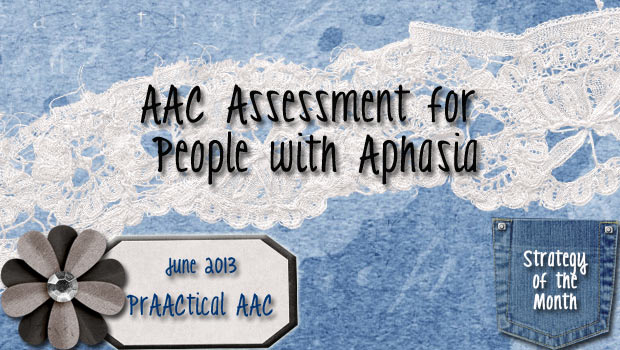
Many people with aphasia fail to regain sufficient speech and language skills to meet their communication needs. With more than one million people with aphasia in the US alone, chances are most people reading this know at least one person affected by the disorder. While many go on to regain functional speech and language skills, some remain unable to communicate well enough catch up with a neighbor, talk about bills with a spouse, ask a question in a store, play with a grandchild, or tell their healthcare providers about side effects or symptoms. It’s hard to really imagine how devastating and isolating this experience may be. Aphasia Awareness Month seemed like the perfect time to reach out to SLPs with information on AAC for people with aphasia. In this post, we’ll share some thoughts and resources on assessment. Assessment activities are, of course, driven by the purpose for which the... [Read More...]
May 27, 2013
by Carole Zangari -
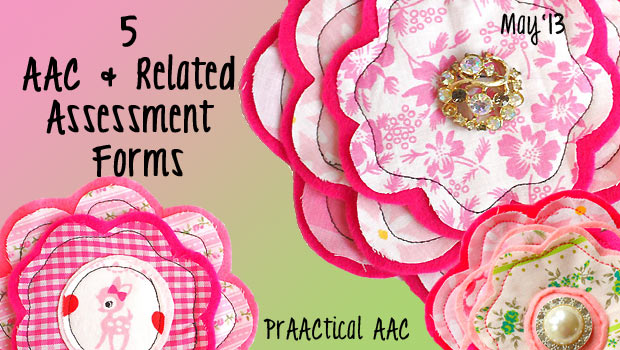
Ask any 10 professionals how they do AAC evaluations and you’re likely to get 10 different answers. We look for the same things (I think!) but go about it in different ways. We’re always happy to take a look at the protocols and forms that our colleagues develop and/or use. Here are some that might be of interest. 1. Bloom and Lahey Recording Sheet for staging language by Sherri Vernelso and Emily Pratt 2. Kate Ahern’s form for AAC device trials 3. SETT process assessment forms by HILIA Coordinators of Assistive Technology Services 4. The Functional Behavior Assessment Worksheet and Observation Forms by PaTTAN 5. Assessing the metaphoric use of pictures (e.g., Minspeak, Unity) protocol and forms by Gail Van Tatenhove If you have a protocol or form that you’d like to share, please get in touch. We’re always looking for new and better tools.
March 17, 2013
by Carole Zangari -
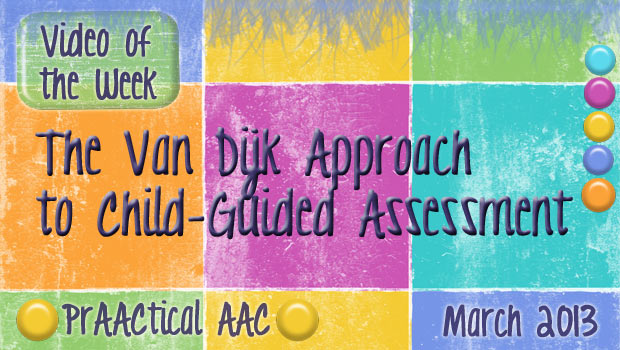
Getting good assessment information on learners with multiple disabilities, hearing, and vision loss is difficult, to say the least. Today we travel to the Netherlands to learn from Dr. Jan Van Dijk, who has pioneered an approach to working with individuals who have deafblindness. This series of webcasts, produced by Perkins School, discusses the theoretical underpinnings and practical aspects of the Van Dijk approach to child-guided assessment.
March 16, 2013
by Carole Zangari -
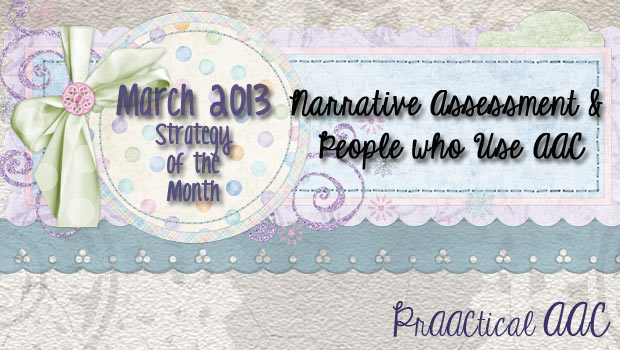
This month, we’ve been talking about building narrative skills in our AAC clients. We tried to build the case that including narrative language goals in our intervention allows us to help people who use AAC to participate more fully in social exchanges, relay more in-depth information, and achieve greater academic success. But how do we know where to start in narrative intervention? And how do we measure progress? In this post, we share some thoughts on the assessment of narrative language in AAC. Most test batteries that assess narrative language are designed to take a snapshot of what the learner has already mastered in terms of telling personal narratives, story retelling, or scripts. This allows us to look beyond MLU, morphology, and grammar and can be useful in determining whether intervention is needed. Some scholars, however, have noted the limitations of this “one shot” approach, particularly for learners whose communication... [Read More...]
July 26, 2012
by Carole Zangari -
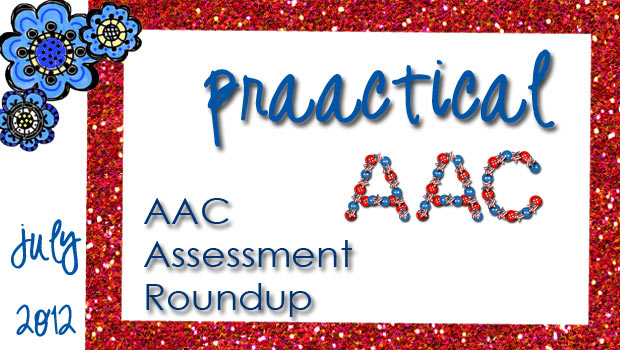
Some posts that may be helpful for planning AAC assessments 92 Free or Lite Versions of AAC Apps Introducing RELAAACs: Rubric for Evaluating the Language of Apps for AAC PrAACtical Resources: Making Decisions about Reading Accessibility Options PrAACtical Questions: How Do I Find Good AAC Service Providers? PrAACtical Questions: How Can I Get AAC Devices for My Evaluations? 5 Tips to Make AAC Assessments Run Smoothly Sites We Love: Online AAC Assessment Tool 5 Things To Do Before You Choose an AAC App: Take A GULP
March 17, 2012
by Carole Zangari -
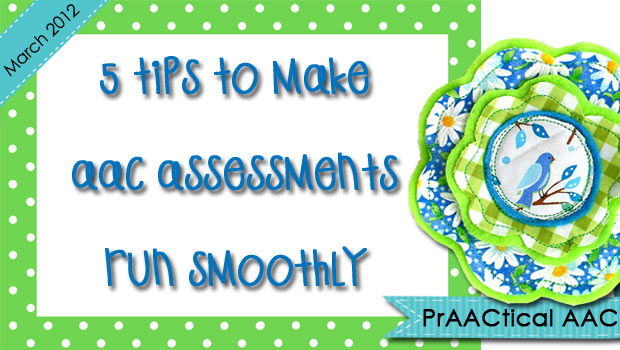
No one likes to be tested, least of all people with communication difficulties who don’t have the tools to express their anxiety or discomfort in the ways they would like to. Some of the people we evaluated had real issues with this and so we’ve experimented with ways to make the testing less stressful and more productive. Here are some of the strategies that we found to be most successful. – 1. Work with the team to establish Fair Testing Practices for the person you’ll be evaluating. Our chapter on ‘Language Assessment for Students Who Use AAC’ describes this in more detail, but essentially it involves writing a ‘rule book’ for how to test this person. It might specify how long the test session can/should be, how to set up the situation so the person can respond, and what other supports are needed so that we are testing the person’s... [Read More...]









